News + Articles
What is the Best Type of Dental Crowns Material?
Patients ask me, “What is the best material for dental crowns?” The options often include gold, porcelain, and zirconia. However, choosing it takes time.
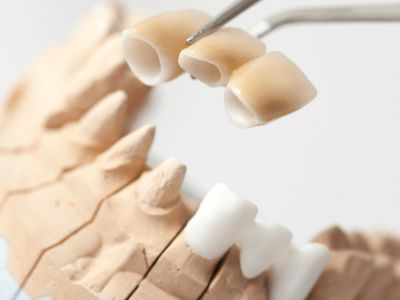
This guide will make your choice more accessible. We’ll help you find the ideal fit for your unique smile.
Different Types of Dental Crown Material Used
Metal Crown (Gold Crown)
Gold crowns are known for their durability, often lasting 10-15 years or more with proper dental care. However, their noticeable gold alloy appearance makes them a less popular choice than porcelain or ceramic crowns.
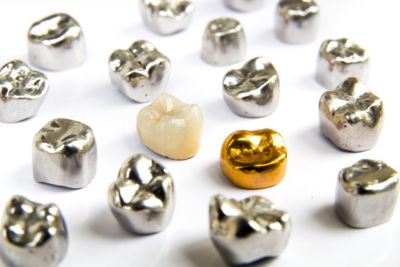
In addition, other metal alloys used for crowns include metal bases chromium-cobalt or nickel-chromium.
Porcelain Crowns
Crowns are made of porcelain, ceramic, or types of all-ceramic crowns that provide the most natural appearance and are biocompatible with gum tissues.
They are an excellent choice for front teeth and cosmetic restorations. Porcelain or ceramic crowns can closely match the color and clarity of your natural teeth.
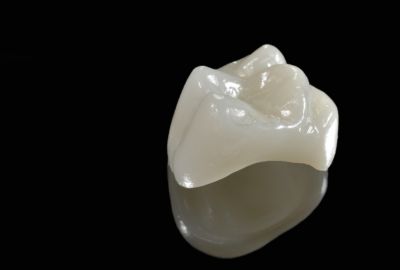
Porcelain dental crowns can be more prone to chipping or breaking than metal. However, advancements in dental ceramics have improved their strength.
Porcelain Fused to Metal Crown
PFM crowns are a well-known dental repair material. They combine strong metal with natural-looking porcelain. The porcelain exterior complements your smile well. The metal core ensures durability for chewing.
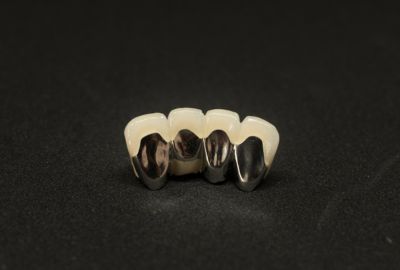
PFM crowns cost less than all-porcelain crowns. But they might show a faint metal line at the gum line. This is especially true if a gum recession occurs.
Zirconia Crowns
Dental technicians craft zirconia crowns from zirconium dioxide. It’s a very strong and durable ceramic. These strong restorations last a long time. With proper care, they often improve smiles for over a decade.
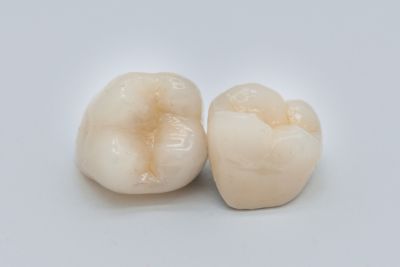
Advantages
Strength and Durability: It resists chipping and cracking well. It is good for molars and bruxism cases.
Natural Aesthetics: Layered and high-translucent options mimic the appearance of original teeth.
Biocompatibility: Well-tolerated by the body, minimizing allergic reactions.
Customization: This can be precisely milled to fit individual teeth.
Conservative Preparation: Requires minimal removal of natural tooth structure.
Stain Resistance: Maintains its color and luster over time.
Disadvantages
Potential Wear: This may cause wear on opposing teeth due to hardness.
Limited Reparability: Difficult to repair if chipped or damaged.
Cost: It can be more expensive than other crown materials.
Potential Bonding Challenges: These may require specific bonding techniques for optimal adhesion.
EMAX Crowns (lithium disilicate crowns)
Lithium disilicate ceramic makes E-MAX crowns. They copy the natural see-through and color of teeth. This makes them popular for enhancing smiles for front teeth and suitable for back teeth. The choice depends on your needs and your dentist’s advice.
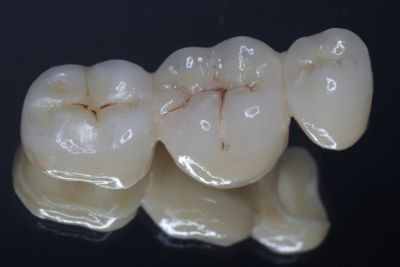
E-MAX crowns can look better than zirconia or porcelain-fused-to-metal (PFM) crowns. Zirconia crowns can appear opaque, while PFM crowns may exhibit a visible metal line at the gum line.
E-MAX crowns provide a lasting solution for a confident smile. Their longevity can vary and depends on factors like oral hygiene and habits. But their resilience makes them an excellent investment in your oral health.
Resin crowns
Advantages
Aesthetics: It can match the color of your original teeth, making them a good choice for front teeth.
Cost-effective: They are generally less expensive than other types of crowns, such as porcelain or gold.
Conservative preparation: It often requires less removal of natural tooth structure than other crown types.
Disadvantages
Durability: They are less intense than other types of crowns and may chip or break over time.
Wear: They can wear down more quickly than other types of crowns, especially if you grind or clench your teeth.
Staining: It can stain more quickly than other types of crowns, especially if you consume coffee, tea, or red wine.
Resin crowns are a good option for people who want a low-cost, good-looking way to fix their teeth. However, it’s essential to know resin crowns’ potential drawbacks before deciding.
Choosing the Best Material for Getting a Crown
We believe that many factors should be considered. They are important when selecting the best crown material.
Aesthetics
A natural look is a top priority, especially for front teeth. All ceramic, porcelain, or E-MAX crowns are great options for this.
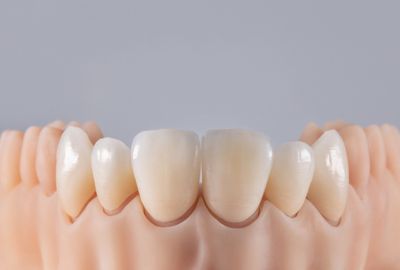
These materials can match the color of your nearby teeth. They often produce natural and excellent results. In addition, You may consider zirconia crown. It’s solid and durable, especially for back teeth.
Durability
Gold or zirconia crowns for molars or teeth subject to heavy biting forces. These materials offer superior strength and durability to withstand chewing forces.
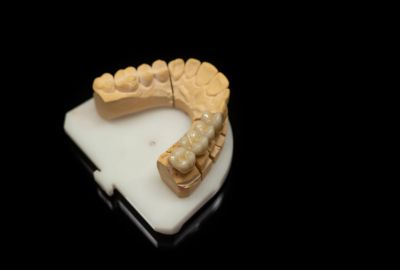
PFM (Porcelain-Fused-to-Metal) crowns can be durable. However, the porcelain part may chip or break under heavy stress.
Location
Restorations for front teeth focus on looks and functionality (biting and speech). However, back teeth restorations focus on being solid and durable. This is because they are for chewing.
When you recommend a material, please consider the placement of the crown. You can place crowns on either the front or back teeth.
Cost of dental crowns
The average cost of a dental crown can vary a lot. It depends on many factors, including the material used, the complexity of the procedure, and the location. Here’s a breakdown of the typical costs:
1. Porcelain crowns for front teeth typically range from $800 to $3,000 per tooth.
2. Metal Crowns: These are the most durable and are often used for molars—their cost ranges from $600 to $2,500 per tooth.
3. Porcelain-fused-to-metal (PFM) Crowns usually cost between $500 and $1,500 per tooth.
4. Zirconia Crowns are known for their strength and looks. They cost $1,000 to $2,500 per tooth.
5. Additional Costs: Other costs include dental exams ($50-$200) and X-rays ($25-$50). You may also face core build-up ($200-$500) and post and core procedures ($250-$650) if needed for support.
The average cost for a dental crown, including all associated procedures, ranges from $1,100 to $1,500. However, in some cases, especially in high-cost areas or for extensive dental work, the total can go up to $3,000 or more.
Also, note that dental insurance can cover much of the cost. But only if the crown is needed for medical reasons. Without insurance, the out-of-pocket expenses can be substantial.
Finally, the best crown material depends on your needs and preferences. You should consult a dentist to discuss the best choices for your case.
Dental Crowns procedure
A dental crown requires two appointments to complete. We’ve prepared the tooth. We take impressions and put on a temporary crown at the first visit.
After this, the lab makes the permanent crown. The dentist cements it onto the prepared tooth at the next appointment.
We use local anesthetic (standard practice) to provide minimal discomfort during dental procedures.
Taking good care of your restoration can prolong its life. This care includes cleaning and flossing near your crown. It also includes getting regular dental exams.
Dental crowns can last:
- Zirconia or gold crowns lasts 10-15 years. (These are averages, and results can vary significantly in individual variation.)
- E-MAX and Porcelain crowns can last 5 to 15 years. (These are averages, and results can vary significantly in individual variation.)
- PFM: 10 to 15 years (These are averages, and results can vary in individual variation.)
However, diet and grinding habits (bruxism) can affect a crown’s lifespan. It causes matter in oral health, too.
Important Note: Please ask a dentist for accurate and personalized info. They have information about dental crown procedures and their expected lifespan.
Frequently Asked Questions
When do you need a crown?
After a complete exam, your dentist will decide the best action. However, common reasons for a crown include:
- Strengthening a tooth weakened by decay or a large filling.
- Safeguarding your tooth after a root canal treatment.
- Enveloping an implant dental.
- Restoring a cracked, broken tooth, or damaged tooth.
- Achieving better biting alignment.
- Enhancing your smile’s aesthetics.
Are dental crowns painful?
Getting a dental crown shouldn’t be painful with proper anesthesia. Following the surgery, some soreness is possible. But you can usually manage it with over-the-counter pain relievers.
How much does a dental crown cost?
A type of dental crown might cost various amounts. It depends on the material, location, dental insurance, the complexity of the procedure, and the dentist’s expertise… Porcelain crowns are more expensive than metal crowns. Contact your insurance company to determine your coverage for dental crowns.
Can dental crowns get cavities?
The crown material can’t get cavities. However, decay can start under the crown (where tooth and crown meet) if oral hygiene is lacking often.
How long does it take to get a dental crown?
First Appointment:
- Cleaning out decay and shaping the tooth are standard procedures.
- Impressions or scans are essential for creating a custom crown.
- Dentists place a temporary crown to protect the tooth. They do this while they’re making a permanent one.
Second Appointment:
- The two-to-three-week time frame is accurate for traditional crown fabrication.
- Removing the temporary crown and cementing the permanent one are the main steps.
CEREC Technology:
CEREC does allow for same-day crowns, eliminating the second appointment. But not all dental practices have it.
Does a dental crown look natural?
Porcelain, ceramic, and E-MAX crowns look very natural. They can match the color and clarity of your teeth.
However, they may not be indistinguishable from the original teeth, primarily upon close inspection. The final appearance of a crown depends on the dentist’s skill and the quality of the crown material.
Conclusion
Consider your needs and priorities. Use them to choose the best crown material. Aesthetics, durability, tooth location, and cost all play a role. This will part of affect your decision.
Our goal at Restoration Dental is to help you achieve your ideal smile. We’re the best dentistry practice in Orange, CA. Do you need a crown or have any questions?
Make an appointment with the dental office today. Our staff will identify the best crown material. This will restore your tooth’s health, function, and appearance.
Check out what others say about our services: Read our Google Reviews.

Dr. Ronald Pham, DDS, is a Doctor of Dental Surgery who graduated from the USC Ostrow School of Dentistry in 2015. With over 8 years of experience in restorative dentistry, including dental implants, crowns, bridges, fillings, root canals…
Dr. Pham has restored the smiles of +2,000 patients and is committed to providing professional dental care focused on patient comfort. He achieves this by combining a welcoming space and state-of-the-art dental technology.

Guaranteed Smiles!
As a premiere dentist office in Orange CA, we will always make sure that your experience is memorable, friendly, and professional. We strive to meet your highest expectations in every way imaginable, from your very first interaction with our office staff, to the quality of treatment you receive. We don’t take our patients’ trust for granted, and will promise to over-deliver with your best interest in mind. So give us a call today, and experience our first-class service!
Insurance
Accepted
We proudly accept most dental insurance plans, and welcome cash patients as well. Call us today for more information.
$199
Special
New to our dental office? Take advantage of our New Patient special offer with x-rays, exam, and full report of findings.
Extended
Hours
Do you have an emergency? Need to see us a little later or earlier? Let us know. We can be flexible to meet your busy schedule!
